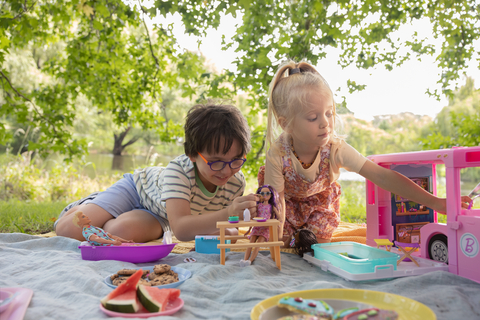Latest Findings: Doll Play Prompts Children to Talk About Others’ Thoughts and Emotions
Mattel, Inc. (NASDAQ: MAT) has shared findings from the second year of a multi-year study with Cardiff University, examining the developmental impacts of doll play on children. The research indicates that playing with dolls enhances children's use of internal state language (ISL), which correlates with increased brain activity in regions linked to social and emotional processing. The study emphasizes the importance of doll play in developing empathy and social skills, especially as parents express concerns over their children’s emotional development post-pandemic.
- Doll play enhances children's internal state language (ISL), crucial for developing social skills.
- The study shows increased brain activity in regions related to social and emotional processing during doll play.
- Parents value empathy as a key social skill for their children, aligning with the research findings.
- 61% of parents report their child's social-emotional development has been negatively impacted by the pandemic.
Insights
Analyzing...
-
Year two of the study builds on long-term research from
Cardiff University neuroscientists exploring the impact of doll play on children, commissioned by Barbie® - In year one of the study, research found playing with dolls activated parts of the brain that allow children to develop empathy and social processing skills

Latest Findings: Doll Play Prompts Children to Talk About Others’ Thoughts and Emotions (Photo: Business Wire)
The latest research found children talked more about others’ thoughts and emotions, a concept known as internal state language (ISL), when playing with dolls than while playing tablet games. Speaking about others’ internal states allows children to practice social skills they can utilize when interacting with people in the real world and can potentially be beneficial to children’s overall emotional development.
“When children create imaginary worlds and role play with dolls, they communicate at first out loud and then internalize the message about others' thoughts, emotions and feelings,” said researcher Dr.
During observation of children*, researchers saw increased brain activity in the posterior superior temporal sulcus (pSTS) region when they spoke as though their dolls had thoughts and feelings. The pSTS region is heavily involved in the development of social and emotional processing skills, further supporting year 1 findings, that even when children play by themselves with dolls, it can help build vital social skills like empathy.
The study used state-of-the-art functional, near-infrared spectroscopy equipment to explore activation of the brain while children played with dolls and on tablets, both by themselves and with another person. The researchers found playing with dolls prompted more ISL about others than playing with tablet games, and using ISL about others was related to increased pSTS activation.
“Internal state language can indicate that a child is thinking about other people's thoughts and emotions while playing with dolls,” said researcher Dr.
Empathy and social processing skills appear to be highly valued by parents and essential as children continue to grow emotionally, academically and socially. In 2020, Barbie independently commissioned a global survey** that suggested 91 percent of parents ranked empathy as a key social skill they would like their child to develop, but only 26 percent were aware that doll play could help their child develop these crucial skills. Parents and caregivers have also been increasingly concerned over their children’s developmental track during the last two years. In fact, 61 percent of parents reported that their child’s social-emotional development had been negatively impacted by the pandemic***.
While cognitive and social stimulation outside of homes has been limited due to the pandemic, the Cardiff University research suggests that doll play can offer kids the opportunity to emulate scenes and interactions from their daily lives. Children mimic what they see their parents, teachers or peers say and do, and dolls can give them an outlet to recreate what they've seen and heard to rehearse skills they can use in real-life social situations.
The research also suggests that these findings are gender agnostic – revealing the comprehensive critical importance of doll play in practicing social skills.
“We’re proud that when children play out stories with Barbie and vocalize their thoughts and emotions, they may be building crucial social skills, like empathy, that give them the tools needed to be confident, inclusive adults,” said
The results of this second year of research, titled Doll play prompts social thinking and social talking: Representations of internal state language in the brain, were published in Developmental Science in 2021 by Dr.
In Fall 2020,
Parents and caregivers can visit Barbie.com/Benefits to learn more about the research and access resources.
*Study was commissioned by Barbie. Study was conducted with 33 boys and girls aged 4-8 years old
**Survey by OnePoll in
***According to Harvard’s Saul Zaentz Early Education Initiative’s Early Learning Study (
About
About
MAT-BARB
View source version on businesswire.com: https://www.businesswire.com/news/home/20220208005388/en/
News Media
Devin.Tucker@Mattel.com
Source:







